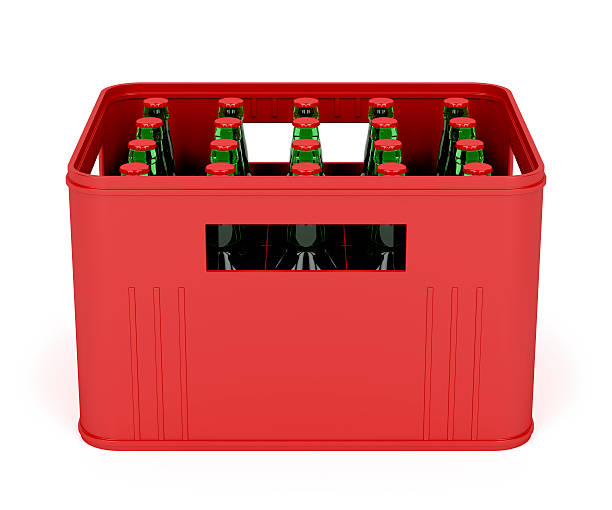
The global beverage crate market is poised for significant growth, with a projected valuation of USD 668.20 million by 2034, up from USD 404.20 million in 2024. This growth trajectory is supported by a compound annual growth rate (CAGR) of 5.20% over the forecast period.
In 2019, the market was valued at USD 338.20 million, and over the past four years, it has grown at a CAGR of 3.62%, adding USD 66 million in revenue. Several key factors are driving this upward trend, positioning the beverage crate market for continued success.
Core Concepts in the Beverage Crate Industry
- 2024 Market Value: USD 404.20 million
- 2034 Projected Value: USD 668.20 million
- Growth Rate: Expected CAGR of 5.20% from 2024 to 2034
- 2023 Valuation: USD 383.9 million
- Leading Companies: Schoeller Allibert, Polymer Logistics, DS Smith Plastics, IPL Plastics, Craemer Group
- Market Trend: Steady growth driven by increased demand and logistical efficiency
Key Market Drivers:
- Rising Beverage Consumption: The global consumption of beverages, including soft drinks, beer, water, and juices, continues to rise steadily, propelling the demand for robust packaging solutions such as beverage crates.
- Retail Expansion: The expansion of retail chains, supermarkets, convenience stores, and e-commerce platforms necessitates reliable packaging solutions to ensure beverages are safely transported and delivered to consumers worldwide.
- Popularity of Specialty Beverages: The growing popularity of craft beers, artisanal sodas, and specialty beverages drives demand for packaging solutions tailored to accommodate niche products, further fueling market growth.
- Sustainability and Cost-effectiveness: Reusable beverage crates are increasingly preferred by businesses and consumers due to their sustainability and cost-effectiveness, aligning with global efforts to reduce single-use plastics and promote responsible packaging practices.
- Optimization of Supply Chains: Beverage manufacturers and distributors are adopting bulk purchasing strategies to optimize costs and enhance operational efficiency, driving demand for efficient packaging solutions.
Challenges and Restraining Factors:
- Shift Towards Eco-Friendly Packaging: The growing preference for eco-friendly alternatives such as biodegradable containers, cardboard boxes, and pouches poses a challenge to traditional beverage crates.
- Emergence of Reusable Packaging Services: Subscription-based crate rental services and reusable packaging platforms offer alternatives to traditional packaging, impacting the beverage crate market.
- Changing Consumption Trends: On-the-go consumption preferences and demand for smaller pack sizes affect the demand for large-format beverage crates, influencing market dynamics.
- Waste Management Concerns: Environmental concerns surrounding recycling participation and end-of-life beverage crate disposal contribute to consumer hesitance towards traditional beverage crate options.
- Integration of RFID Technology: Some beverage crate manufacturers are incorporating Radio-Frequency Identification (RFID) technology to enable efficient tracking, inventory management, and supply chain optimization.
Some of the key takeaways from the report are highlighted below-
- HDPE will remain highly preferred material used for making beverage crates
- The demand for nestable and stackable beverage crates will continue rising through the forecast period
- The rise in application of beverage crates in alcoholic drinks is expected to propel growth of the market during the forecast period
- East Asia will dominate in the global beverage crates market. China is expected to emerge as the most lucrative market for beverage crates in the region
- Europe will emerge as another lucrative region in the global market
Access Full Report: https://www.futuremarketinsights.com/reports/beverage-crates-market
Key Segments:
By Material Type:
- HDPE (High-density polyethylene)
- PP (polypropylene)
- Others
By Product Type:
- Nestable and Stackable
- Collapsible
By Application:
- Alcoholic Drinks
- Beer
- Wine
- Spirits
- Other Alcoholic Beverages
- Non-alcoholic drinks
- Fruit juices
- Carbonated drinks or soda
- RTD beverages
- Bottled water
- Tea & coffee
- Milk Products
About Future Market Insights (FMI)
Future Market Insights, Inc. (ESOMAR certified, recipient of the Stevie Award, and a member of the Greater New York Chamber of Commerce) offers profound insights into the driving factors that are boosting demand in the market. FMI stands as the leading global provider of market intelligence, advisory services, consulting, and events for the Packaging, Food and Beverage, Consumer, Technology, Healthcare, Industrial, and Chemicals markets. With a vast team of over 400 analysts worldwide, FMI provides global, regional, and local expertise on diverse domains and industry trends across more than 110 countries.
Join us as we commemorate 10 years of delivering trusted market insights. Reflecting on a decade of achievements, we continue to lead with integrity, innovation, and expertise.
Contact Us:
Future Market Insights Inc.
Christiana Corporate, 200 Continental Drive,
Suite 401, Newark, Delaware – 19713, USA
T: +1-347-918-3531
For Sales Enquiries: sales@futuremarketinsights.com
Website: https://www.futuremarketinsights.com
LinkedIn| Twitter| Blogs | YouTube